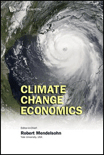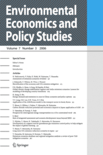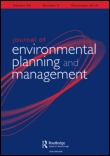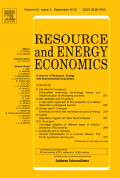
Climate Change Economics
Scope & Guideline
Exploring Economic Pathways to Environmental Resilience
Introduction
Aims and Scopes
- Economic Impacts of Climate Change:
Research exploring how climate change affects various sectors of the economy, including agriculture, energy, and finance, assessing both direct and indirect economic consequences. - Adaptation and Mitigation Strategies:
Studies that evaluate policies and practices aimed at reducing greenhouse gas emissions and adapting to climate impacts, including economic models and assessments of their effectiveness. - Climate Finance and Investment:
Investigations into the role of financial mechanisms, investment strategies, and market responses to climate risks and opportunities, highlighting the importance of sustainable finance. - Behavioral and Social Dimensions:
Research examining how societal behaviors and norms influence climate change adaptation and mitigation efforts, including consumer preferences and community responses. - Technological Innovations and Solutions:
Exploratory studies on advancements in technology aimed at reducing carbon footprints, enhancing energy efficiency, and enabling sustainable practices in various industries. - International Climate Agreements and Policies:
Analysis of the economic implications of global climate policies, treaties, and agreements, assessing their impact on national and international economic systems.
Trending and Emerging
- Climate Risk Assessment in Finance:
An increasing number of studies are focusing on how financial institutions respond to climate risks, indicating a growing recognition of the financial implications of climate change. - Technological Solutions for Emission Reductions:
Emerging research on innovative technologies, particularly in renewable energy and energy efficiency, showcases a trend towards identifying practical solutions for mitigating climate change. - Interdisciplinary Approaches to Climate Economics:
There is a notable trend towards interdisciplinary research that combines economics with social sciences, environmental science, and technology, reflecting the complex nature of climate issues. - Global Climate Policy Dynamics:
An increase in studies analyzing the impacts of international climate agreements and national policies reflects a growing importance of understanding the economic implications of global climate governance. - Behavioral Economics and Climate Change:
Research exploring how behavioral economics can inform climate action is on the rise, examining the psychological and social factors that influence climate-related decisions.
Declining or Waning
- Agricultural Productivity Studies:
Research specifically focused on agricultural productivity in relation to climate change has seen a decrease, possibly due to a shift towards broader economic implications rather than sector-specific analysis. - Local Case Studies:
The journal appears to be moving away from localized or singular case studies, which may have been more common in earlier years, in favor of comparative and comprehensive analyses that incorporate broader datasets. - Historical Climate Data Analysis:
While still relevant, the focus on historical climate data analysis seems to be waning as the journal increasingly emphasizes forward-looking studies and predictive modeling. - Sector-Specific Climate Impact Assessments:
The emphasis on detailed assessments of specific sectors (e.g., fisheries, forestry) is declining; there is a trend towards integrated assessments that consider multiple sectors in relation to climate change.
Similar Journals

Mitigation and Adaptation Strategies for Global Change
Uniting Disciplines for Global Environmental ActionMitigation and Adaptation Strategies for Global Change is a prestigious journal published by SPRINGER, focusing on the critical areas of ecology and global change. With an impressive impact factor that places it in the Q1 and Q2 quartiles in their respective categories, this journal serves as an essential platform for researchers, professionals, and students actively engaged in addressing the challenges posed by climate and environmental changes. Since its inception in 1996, the journal has evolved to cover a wide range of interdisciplinary topics, fostering a holistic understanding of mitigation strategies and adaptation practices worldwide. Located in the Netherlands, it benefits from a robust editorial board and significant contributions from leading experts in the field. Although it does not currently offer Open Access, the journal's rigorous peer-review process ensures that only high-quality research is disseminated, making it a valuable resource for anyone seeking to remain at the forefront of global change research.

Arctic Science
Fostering Global Dialogue on Arctic Science and SustainabilityArctic Science is a premier journal published by Canadian Science Publishing, dedicated to advancing our understanding of the Arctic region through interdisciplinary research. With a strong emphasis on topics within Agricultural and Biological Sciences, Earth and Planetary Sciences, and Environmental Science, the journal has established itself as a leading publication, reflected by its impressive Q1 category quartiles and significant SCOPUS rankings. The journal's scope encompasses vital issues related to Arctic ecosystems, climate change, and sustainable resource management, making it an essential resource for researchers, professionals, and students committed to addressing the challenges facing this unique environment. Published from 2019 to 2024, Arctic Science aims to foster globally relevant discussions and disseminate high-quality research that is critical for the scientific community and policymakers alike.

Environmental Policy and Governance
Navigating the Intersection of Policy and SustainabilityEnvironmental Policy and Governance is a premier academic journal published by WILEY PERIODICALS, INC, based in the United Kingdom, dedicated to advancing the understanding and implementation of environmental policy across various governance frameworks. With an ISSN of 1756-932X and E-ISSN 1756-9338, this journal spans from 2009 to 2024, reflecting a rich history of contributions to the field. Renowned for its rigorous scholarship, it holds a prestigious Q1 ranking in both Geography, Planning and Development and Management, Monitoring, Policy and Law, positioning it in the top tier of academic discourse. The journal has made significant strides in promoting interdisciplinary research, fostering dialogue among policymakers, scholars, and practitioners, and addressing pressing global environmental challenges. Although currently not an Open Access publication, its high impact factor underlines its relevance and authority, making it an essential resource for researchers, professionals, and students eager to explore innovative solutions and best practices in environmental governance.

npj Climate and Atmospheric Science
Empowering scholars to address climate challenges.npj Climate and Atmospheric Science, published by NATURE PORTFOLIO, is a premier Open Access journal dedicated to advancing the understanding of climatic and atmospheric phenomena. Since its inception in 2018, this journal has positioned itself as a leader in its field, achieving Q1 ranking in 2023 across key categories such as Atmospheric Science, Environmental Chemistry, and Global and Planetary Change. With a Scopus rank of #23 out of 148 in Earth and Planetary Sciences and a commendable percentile ranking, npj Climate and Atmospheric Science serves as an essential platform for disseminating high-quality research, fostering interdisciplinary collaboration, and addressing critical global challenges. Its open access policy ensures that vital research findings are available to a broad audience, facilitating scholarly engagement and innovation. Researchers, professionals, and students in the fields of environmental science and climate studies will find this journal a valuable resource for cutting-edge studies and transformative insights.

Environmental Economics and Policy Studies
Uniting Economics and Ecology for Lasting ImpactEnvironmental Economics and Policy Studies is a premier academic journal published by SPRINGER, focusing on the intersection of environmental sustainability and economic policy. With a robust ISSN of 1432-847X and an E-ISSN of 1867-383X, this journal serves as a vital resource for researchers, policymakers, and practitioners looking to understand and address the complex issues surrounding environmental economics. Hailing from Japan, it has carved a significant niche in the field since its inception, achieving impressive rankings with a Q2 classification in both Economics and Econometrics, as well as Management, Monitoring, Policy and Law as of 2023. The journal publishes a wide array of high-quality articles, with an emphasis on empirical research and innovative methodologies that influence public policy and economic decision-making. Notably, its Scopus rankings reflect a respectable position within its disciplines, with a percentile ranking of 74th in Economics and Econometrics. The journal continues to contribute to the discourse on sustainable development with a commitment to fostering interdisciplinary research and understanding. Access to this invaluable resource is available through traditional subscription models, making it an essential addition to academic collections for those passionate about the advancement of environmental economics.

Journal of Environmental Planning and Management
Advancing sustainable solutions for a thriving planet.The Journal of Environmental Planning and Management, published by Routledge Journals, Taylor & Francis Ltd, is a leading academic journal dedicated to advancing the field of environmental science through innovative research and critical analysis. With a robust impact factor and categorized in Q1 across multiple disciplines, including Environmental Science, Geography, and Fluid Flow, this journal holds a prestigious position in the academic community. It serves as a vital platform for researchers, professionals, and students interested in the complexities of environmental management, policy, and planning, promoting insightful discourse on sustainable practices and innovative solutions. Although the journal does not currently offer Open Access options, it remains widely accessible through institutional subscriptions, ensuring that pertinent research reaches a broad audience. Since its inception in 1992, the journal has shown a commitment to excellence, making significant contributions to our understanding of environmental issues and the interplay between human activity and natural systems. The Journal of Environmental Planning and Management invites submissions that not only push the boundaries of existing knowledge but also foster interdisciplinary collaboration in the quest for sustainable development.

ENVIRONMENT AND DEVELOPMENT ECONOMICS
Shaping Policies for a Sustainable FutureEnvironment and Development Economics, published by Cambridge University Press, stands as a pivotal journal in the fields of development economics and environmental science. With a robust ISSN of 1355-770X and an E-ISSN of 1469-4395, this esteemed publication has been a significant contributor to scholarly discourse since its inception in 1996 and continues to thrive with a convergence of research insights expected to run until 2024. Distinguished by its Q1 status in Development and its Q2 rankings in both Economics and Econometrics and Environmental Science (Miscellaneous) for 2023, the journal reflects its commitment to high-impact research. Notably, it ranks 58th out of 306 in Social Sciences Development and maintains respectable standings in other categories, emphasizing its importance in shaping policies and practices at the intersection of economics and environmental sustainability. Researchers, professionals, and students engaged in these disciplines can access this journal for thought-provoking articles that advance understanding of economic development while addressing environmental challenges.

ENVIRONMENTAL MANAGEMENT
Championing impactful research in ecology and pollution.ENVIRONMENTAL MANAGEMENT, published by Springer, stands at the forefront of advancing sustainability and ecological stewardship in the fields of Ecology, Global and Planetary Change, and Pollution. With an impressive tracking history from 1977 to 2024 and prestigious quartile rankings reflecting its significant impact (Q1 in Ecology and Q2 in both Global and Planetary Change and Pollution), this journal engages a wide range of stakeholders, including researchers, policymakers, and environmental professionals. The journal is a vital resource for those dedicated to addressing pressing global environmental challenges, publishing rigorous interdisciplinary research that informs policy and practice. While it does not offer open access, its content remains accessible through institutional subscriptions. Located in the heart of New York, ENVIRONMENTAL MANAGEMENT is dedicated to fostering a substantive dialogue on innovative approaches to environmental preservation and management.

RESOURCE AND ENERGY ECONOMICS
Illuminating Economic Pathways in Resource ManagementRESOURCE AND ENERGY ECONOMICS is a premier academic journal published by ELSEVIER, specializing in the intricate fields of economics and econometrics with a particular focus on the intersection of resource management and energy policy. Established in 1993, the journal has been a vital platform for scholars and professionals, contributing to significant advancements in the understanding of economic aspects surrounding natural resources and energy systems. With an impressive impact factor and ranking in the top quartile (Q1) of its category, it is recognized for its rigorous peer-reviewed research that informs both academic inquiry and practical applications in the industry. The journal is based in the Netherlands and caters to a global audience, fostering interdisciplinary discussions aimed at addressing pressing environmental and economic challenges. Accessible primarily through institutional subscriptions, RESOURCE AND ENERGY ECONOMICS continues to shape the discourse in its field, making it an essential read for researchers, policymakers, and practitioners striving for innovative solutions in resource and energy economics.

Journal of Climate Change
Transforming research into actionable solutions for our Earth.The Journal of Climate Change, published by IOS PRESS, is a premier academic platform dedicated to the multidisciplinary investigation of climate change, its impacts, and mitigation strategies. With a focus on promoting innovative research, this journal aims to cultivate dialogue among researchers, policymakers, and environmental professionals globally. While the impact factor signifies its academic significance, the journal prides itself on providing unrestricted access to cutting-edge research insights, fostering collaboration within the scientific community. The journal’s ISSN is 2395-7611, and the E-ISSN is 2395-7697. Whether you are a seasoned researcher or a student exploring the critical implications of climate change, the Journal of Climate Change serves as an essential resource for the latest findings and discussions in this vital field.